Italy, Poland, Romania decline sending troops to Ukraine, chose different course of action
 Illustrative photo: Italy, Poland and Romania refused to send troops to Ukraine (Vitalii Nosach, RBC-Ukraine)
Illustrative photo: Italy, Poland and Romania refused to send troops to Ukraine (Vitalii Nosach, RBC-Ukraine)
Italy, Poland, and Romania have no intention of deploying their troops to Ukraine, even within the framework of security guarantees after a possible ceasefire, according to the statements by the leaders of these countries.
Italian Prime Minister Giorgia Meloni stressed that her country will not send troops to Ukraine. However, Italy is prepared to support monitoring and training initiatives outside Ukraine to contribute to ending hostilities.
Meloni also reiterated her proposal to establish a collective security mechanism similar to NATO’s Article 5, which provides for a collective response to aggression against any member state.
Romanian president Nicuşor Dan confirmed that Romania will not deploy its troops to Ukraine, emphasizing that this decision was taken jointly with all of the country’s political forces. At the same time, Bucharest is ready to participate in peacekeeping operations and stabilization missions.
Polish Prime Minister Donald Tusk likewise stated that Warsaw has no intention of deploying its troops on Ukrainian territory—neither during the ongoing war nor after its conclusion. Instead, Warsaw is ready to provide logistical and other forms of support without the direct involvement of its armed forces in the conflict zone.
Foreign troop deployments to Ukraine
On September 4, leaders of several European countries met in Paris to discuss security guarantees for Ukraine.
Ahead of the coalition of the willing summit, French President Emmanuel Macron announced that the preparation of security guarantees for Ukraine had been completed, with allied contributions documented and confirmed at the level of defense ministers.
Afterward, media outlets reported on the possible size of a European contingent in Ukraine and the roles individual countries might play in supporting a military mission.

